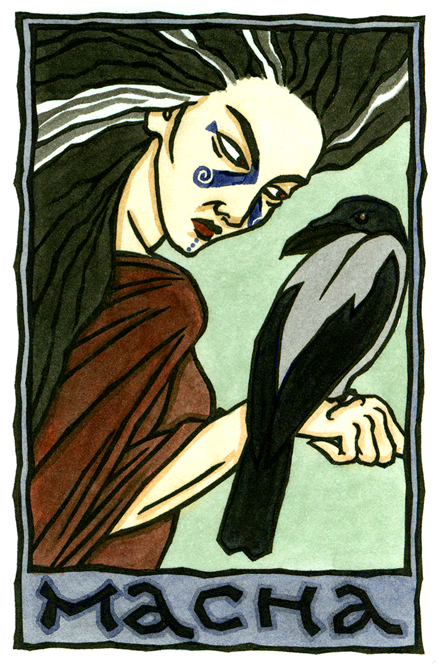 I walk the battlefield at dawn.
Macha is an Irish war Goddess, strongly linked to the land. Several Goddesses or heroines bear Her name, but She is generally thought of as one aspect of the triple death Goddess the Mórrígan ("Great Queen" or "Phantom Queen"), consisting of Macha "Raven," Badb "Scald Crow" or "Boiling," and Nemain "Battle Fury." Macha is associated with both horses and crows. The Mórrígan is both sex and battle Goddess, and Her personality is usually described as both war-like and alluring. She is known to be a prophetess: the Washer at the Ford is said to be one aspect of Her, Who appears to those about to die. She is commonly shown washing bloody clothes at a river ford; when approached, She tells the enquirer the clothes are theirs. Like the bean sidhe (banshee), Whom She is believed related to, She is an omen of death. As Goddess of the land, the Mórrígan are said to be cognate with Ana or Danu, and Macha is said to be one of the Tuatha Dé Danann. Three other aspects of Macha feature in Irish folklore, which likely derive from a common Goddess, as they are all said to have a mother named Ernmas (also considered to be the mother to Eriu, Banba, and Fódla, sacred names for Ireland). One Macha, a seeress, was the wife of Nemed "Sacred," Who invaded Ireland and fought the Fomorians in Irish legend. Emain Macha, a bronze-age hill fort in Northern Ireland, and legendary capital of Ulster, is said to have been named for Her. The second Macha, titled Mong Ruadh ("red-haired"), was a warrior and Queen, who overpowered Her rivals and forced them to build Emain Macha for Her. The third Macha, and probably the most well-known, was said to be the wife of one Crunniuc. Like many supernatural lovers, She warns him to tell no one of Her existence; but he boasts to the king of Ulster that his wife can outrun the fastest chariot. The king then seizes the very pregnant Macha and forces Her to run a race against his horses. In spite of Her condition, She races and does win, and as She crosses the finish line She gives birth. In Her dying pain and anger She curses the men of Ulster to nine times nine generations, that in their time of worst peril they should suffer the pain of childbirth. This card in a reading indicates an omen of change, as the wheel turns to a period of both darkness and fruitfulness. This design is available on prints through ArtPal. |